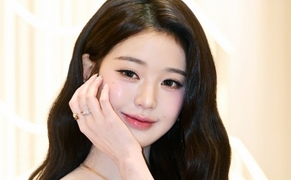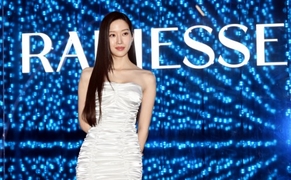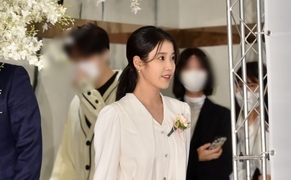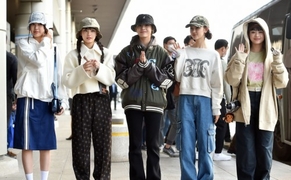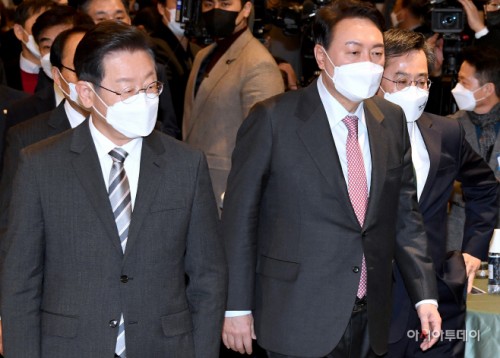 |
| Lee Jae-myung of the Democratic Party, Yoon Suk-yeol of the People Power Party, and Kim Dong-yeon of the New Wave Party attend a New Year’s greeting of the Small Business Association held in Seoul on Jan. 18, 2022./ Photographed by Lee Byung-hwa |
AsiaToday reporter Kim Na-ri
With the presidential election just some 40 days away, presidential candidates are making a flood of populist pledges. The ruling Democratic Party’s candidate Lee Jae-myung and the main opposition People Power Party’s candidate Yoon Suk-yeol are pledging to give more cash handouts to win votes, intensifying the people’s fatigue.
Lee and Yoon are pouring policies that make them seen caring. As a result, there is a growing public criticism that the pledges are focused on winning voters’ hearts.
After his pledge of expanding government health insurance to cover expensive hair transplants was well received by people with hair loss, Lee announced more populist pledges, such as having the national health insurance program cover up to four dental implants without deduction, paying a monthly payment of 100,000 won for the elderly, and providing 1 million won in basic income for cultural artists. In response, Yoon also pledged to raise enlisted soldiers’ monthly salary to 2 million won, and to provide support for postnatal depression treatment. The problem is that there is no mention of ways to raise funds. If the candidates’ pledges are actually implemented, the government’s financial burden would obviously grow.
At the moment, both the ruling and opposition parties are concentrating on providing cash handouts to voters. The government is preparing an additional supplementary budget bill worth 14 trillion won, and both Lee and Yoon are calling to increase the amount of the budget. Aimed at winning votes of small business owners, they claim that they the extra budget should be increased to at least 25 to 35 trillion won.
The minor opposition People’s Party’s presidential nominee Ahn Cheol-soo criticized that the government and the ruling party is serving as a investor of the series of malignant populist pledges ahead of the election.
“What is the difference between the elections under authoritarian regimes and the current elections? It is worse than past elections in terms of harm to the national finances and passing the financial burden to future generations,” Ahn wrote on his Facebook. “If there are presidential candidates who ignore essential reforms and blind the people with populism, it is a crime of erasing the future of the people and the nation to seize power.”
Some argue that the ruling party and the government should have reflected the damages of the self-employed and small businesses affected by the pandemic in the main budget during last year’s budget deliberation.
Amid the crisis in emerging countries’ financial markets caused by the United States’ tightened monetary policy, the presidential candidates of the rival parties made a series of cash handout pledges and many point out that it is impossible to stop the rush of the grey rhino of tapering.
“The populist pledges competitively made by the two candidates seem to attract votes without realistic alternatives to raising financial resources,” said political analyst Yoo Chang-sun. “Whoever is elected, the next administration will likely have a great financial burden to fulfill the pledges.”
#populist pledge #Lee Jae-myung #Yoon Suk-yeol
Copyright by Asiatoday
Most Read
-
1
-
2
-
3
-
4
-
5
-
6
-
7

















